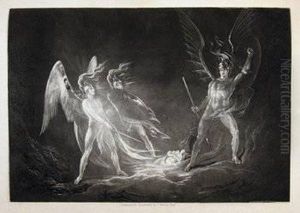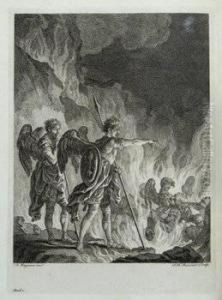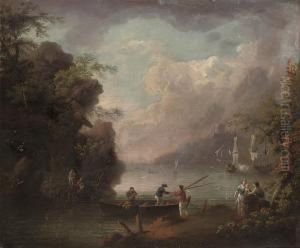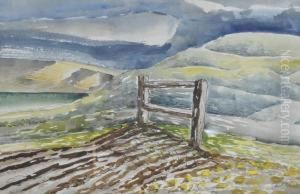John Milton Paintings
John Milton is not principally known as a visual artist, but rather as one of the most significant English poets and intellectual figures of the 17th century. Born on December 9, 1608, in London, England, Milton came of age in a period of political and religious turbulence, which was to shape his career and literary output. He was educated at St. Paul's School, London, and later at Christ's College, Cambridge, where he demonstrated a facility in Latin, Greek, and other languages, which would be evident in his later works.
Milton's literary career can be divided into three phases. The first is his early poetic works, such as the pastoral 'L'Allegro' and 'Il Penseroso', and the masque 'Comus'. In these works, Milton displayed his mastery over the English language and poetic structure and began developing the themes of virtue and temptation that would recur in his later works.
The second phase of his career was marked by his deep engagement with the political and religious controversies of the day. Milton was a staunch republican and a supporter of the Puritan cause, and he produced a series of pamphlets advocating for the abolition of the Church of England's episcopal hierarchy and defending the right of the people to govern themselves. The execution of King Charles I and the establishment of the Commonwealth under Oliver Cromwell saw Milton taking on an official role as the Secretary for Foreign Tongues, essentially serving as a foreign affairs propagandist.
The final phase of Milton's career began after the Restoration of the monarchy in 1660, when he was in danger because of his earlier political writings. Despite his blindness, which began in 1652, Milton completed his most famous work, the epic poem 'Paradise Lost', which was published in 1667. This monumental work explores the biblical story of the Fall of Man through complex blank verse, and it demonstrates Milton's erudition, his deep understanding of human nature, and his profound grappling with themes of freedom, sin, and redemption. This was followed by 'Paradise Regained' and 'Samson Agonistes'.
Milton's influence on English literature and thought cannot be overstated. His works have been studied, admired, and debated for centuries, and his impact on the English language and the epic form is profound. Milton died on November 8, 1674, in Buckinghamshire, England, leaving behind a legacy as one of the greatest writers in the English language.





